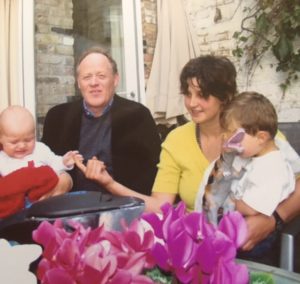 This patient perspective essay was written by Lisa Steen. She has since died. We have permission to publish the piece from her husband, Raymond Brown.
This patient perspective essay was written by Lisa Steen. She has since died. We have permission to publish the piece from her husband, Raymond Brown.
I am a GP, formerly a trainee psychiatrist and now 43 years old. In July 2014, I was diagnosed as having kidney cancer with multiple bone metastases. The cancer was extremely rare, associated with a succinate dehydrogenase B (SDHB) mutation. This genetic condition was later also found to be the cause of my carotid body paraganglionoma which had appeared when I was 18 and was finally excised when I was 27.
I had felt unwell in terms of dizziness and visual symptoms since August 2012, and presented to my GP in September 2012, nearly two years before my diagnosis was made in July 2014. So I spent two years wandering in the wilderness of the medically unexplained.
In fact I had been feeling tired for several months even prior to this presentation in August 2012, and had felt like I was lacking concentration. I had been put on a series of antidepressants, each of which caused “side effects” which may have been symptoms of illness all along. Fluoxetine caused headaches, sertraline caused diarrhoea, and dosulepin caused visual disturbance—at least that’s what I thought at the time.
I had considerable difficulty describing my symptoms: primarily visual disturbance; a sense of being behind a wobbly TV camera; also of diplopia—another image slightly below causing blurring, and negative palinopsia, prompting the GP to refer me to the eye clinic urgently, where all examinations were shown to be normal.
 There were many other minor symptoms too: fatigue, palpitations, cramps in my hands and feet, subtle cognitive impairments, difficulty finding words, memory problems, difficulty coping at work. I had time off sick even though I previously had an intact sick leave record. I had headaches which were worse on standing, also an altered sensation in a glove and stocking distribution, mild tremor, and gradual weight loss without dieting.
There were many other minor symptoms too: fatigue, palpitations, cramps in my hands and feet, subtle cognitive impairments, difficulty finding words, memory problems, difficulty coping at work. I had time off sick even though I previously had an intact sick leave record. I had headaches which were worse on standing, also an altered sensation in a glove and stocking distribution, mild tremor, and gradual weight loss without dieting.
My GP sent me to a psychiatrist mainly because I had been on so many antidepressants, and we didn’t know which to choose next. But also because I had initially interpreted these symptoms as SSRI withdrawal or dosulepin side effects.
The psychiatrist’s immediate instinct was that the illness seemed “organic” not psychiatric, and neither was it SSRI withdrawal or dosulepin side effects.
A neurologist’s advice was sought and her first thoughts were of hypothyroidism or low calcium. The neurologist also requested an ultrasound of the neck as I had concerns that it was something to do with my previous carotid body tumour, and I wondered if it had returned.
The ultrasound and bloods proved normal. The neurologist did not find anything abnormal on examination apart from a Horner’s syndrome (longstanding and related to the previous carotid body surgery). An MRI of my head was subsequently normal.
The psychiatrist made a diagnosis of depression and health anxiety.
I did not entirely believe my psychiatrist however, mainly because the visual symptoms were so florid. I considered myself very psychologically aware and was not convinced about the anxiety/depression diagnosis. Though, unfortunately I had proved a highly suggestible subject during the cognitive behavioural assessment, due to having been trained in CBT myself.
 The symptoms did indeed get worse with stressful situations, but this was partly because those situations occurred whilst standing—such as presenting patients on the morning ward round. This had been a factor in stopping work, because there were problems with my word finding and memory. On reaching the patient’s bedside I found myself almost hallucinating in terms of palinopsia, purple haze and blotches, all of which was very distracting whilst trying to contribute to the ward round. It was impossible really to continue working without working life becoming a total humiliation. This did indeed lead to low self worth and anxiety. The low level acute confusional state, as I now see it, meant that I was functioning at a suboptimal level at work, for no clear reason, this then led naturally to anxiety and concern. It was then difficult for me to untangle my own symptoms from psychiatric ones.
The symptoms did indeed get worse with stressful situations, but this was partly because those situations occurred whilst standing—such as presenting patients on the morning ward round. This had been a factor in stopping work, because there were problems with my word finding and memory. On reaching the patient’s bedside I found myself almost hallucinating in terms of palinopsia, purple haze and blotches, all of which was very distracting whilst trying to contribute to the ward round. It was impossible really to continue working without working life becoming a total humiliation. This did indeed lead to low self worth and anxiety. The low level acute confusional state, as I now see it, meant that I was functioning at a suboptimal level at work, for no clear reason, this then led naturally to anxiety and concern. It was then difficult for me to untangle my own symptoms from psychiatric ones.
Since I was being paid to be off sick, I felt it my duty to follow orders. So therefore to pursue psychological cure—though at the same time I was reading about the physical causes of my symptoms.
I spent the next few months trying to address my apparent mental health problems with a psychologist, and I mainly considered myself to have a psychosomatic illness maybe some sort of conversion disorder. Unusually, I worked backwards, as it were, to exclude a psychiatric illness so as to realise I had a medical illness.
But I gradually became convinced that exertion and not anxiety caused the visual symptoms to worsen, I also thought that the nature of the symptoms “felt” organic because of the pronounced and ongoing visual symptoms.
I then started to look for threads, clues, and a way forward to get treatment. This was thwarted by my earlier diagnosis of health anxiety and having medically unexplained symptoms. One could not be dogmatic in further requests for investigations for fear of looking even more “anxious” or suffering from “health anxiety,” aka a hypochondriac. I wanted to ask the GP for a chest x-ray and abdominal ultrasound, and thought about paraneoplastic syndromes but I always tended to think it was not cancer, in view of the normal inflammatory markers and the length of time it had gone on. But I suspect also it was a pitfall of being forced into the “physician heal thyself” situation.
I saw a vascular surgeon, privately, wondering if the carotid was narrowed by scar tissue from the previous surgery, thinking maybe inadequate blood supply to the brain/retina could be occurring—which is the cause of physiological palinopsia. The carotid was not narrowed, but the vascular surgeon who performed the duplex ultrasound suggested that I might have a genetic disorder and have a phaeochromocytoma, which was something that impacted on his field. I persuaded my GP to order a 24 hour metanephrine test which frustratingly came back negative. At my behest the GP also did blood tests for SLE, and infectious serology screen.
In Spring 2013, I presented to A&E with palpitations, whilst on holiday (the palpitations unhelpfully disappeared on arrival in A&E). The heart rhythm was normal, but the A&E doctor was convinced she heard a third heart sound, and suggested a follow up.
So the next relevant thing seemed to be referral to a cardiologist, in June 2013. I suggested to the cardiologist the possibility of a genetic syndrome related to carotid body tumours. The cardiologist was a kindly man, but after exclusion of any cardiac conditions with an echo and 24 hour tape he began to consider the initial health anxiety diagnosis—or at least it looked like that to me. Once again a kind of consulting room glazing occurred and I was left once more looking like a goldfish. My mouth moving but no sound conveyed to the doctor’s ears. This was by now a familiar feeling to me.
The cardiologist did at least acquiesce to my suggestion that I may have POTS syndrome: postural orthostatic hypotension and suggested referral to a specialist. So I could have some excuse for being off sick.
By now I had gone back to work. There had been a rotation, and I was assigned to a consultant psychiatrist, who made it her mission to rehabilitate me back to work.
By August 2013, I hoped that I had found a thread, something tangible that the specialist could investigate secondary causes of. The POTS specialist did at least do a full examination, though he was not worried about my concerns of a possible pulsatile mass on the left flank, and thought my aorta was just rather left of centre. A tilt table test was organised which was “borderline positive.” In February 2014 further urinary and blood metanephrines were normal. All bloods were repeated and normal. The ESR and CRP remained very low.
At this point I gave up my quest: I was back at work, part time with a benevolent boss, and coping, though tired. I had adapted to my visual disturbance and could now function with it, though I was still embarrassed by my word finding difficulties. I tried to be more organised, and write everything down.
I still knew there was something wrong, but it seemed so fruitless going to see specialists. It was so humiliating, feeling like a goldfish with no voice. Watching doctors’ faces glaze over at the multitude of symptoms. Trying to fit it all in with work and looking after my family.
I decided it would have to wait for clinical events to become more diagnosable. I had tried as hard as I felt reasonably possible. It is also taboo to discuss one’s own health in any depth at work, and I was so exasperated by it all that I felt I would cry if anyone were too sympathetic—which doctors might then interpret as a psychiatric symptom.
In February 2014 I had a follow up with an occupational health doctor. This time the occupational health doctor became concerned, and noticed that I had lost weight and suggested seeing a bowel specialist in relation to a change in bowel habit and to see a neurologist about my numb hands and feet.
I went home and gave myself a full examination. This time I was sure. I found a large mass in my left flank.
I saw my GP, but they couldn’t feel it. I saw my POTS specialist a couple of weeks later and he thought it might be an enlarged spleen. He ordered a routine ultrasound.
One evening in June 2014 the junior radiology technician, working on a waiting list initiative, found a solid/cystic mass 10cm in diameter arising from the left kidney.
I was initially jubilant thinking this would turn out to be a phaeochromocytoma—maybe dopamine secreting. And now I could have an “anxietyectomy.” An urgent CT of the abdomen and pelvis was recommended.
The result was not cause for celebration. The CT showed that the mass was arising from the left kidney and was reported as looking like a renal cell carcinoma. There were also multiple sclerotic lesions in the spine, ribs, and pelvis reported as metastases.
By then I had abandoned my psychiatric training. I had felt unable to study because of “brain fog,” however I had managed to get over the many hurdles to get back my GP status, which involved three exams and six months of retraining.
I had just landed a job as GP Lead for Inclusion service, treating patients with drug and alcohol problems. But the news came just a few days after my interview and offer of the post. My progression through medical services was much more efficient after that and I saw an oncologist and the urologist urgently.
***
I do not know how long I’ll live. It probably won’t be for many weeks. But right now I am glad to be alive, I am grateful for the expensive drug which is holding back the cancer. I am angry at being left in the medically unexplained wilderness and I did not like the way my colleagues looked at me, when they believed me to have health anxiety.
If anyone of the doctors I saw had gone another mile they would’ve stumbled upon it. I almost told them the answer; I repeated over and over my belief of a genetic syndrome linked to the carotid body, something related to it, but they were unable to hear the answer from a patient. They were reluctant to lay their hands on and examine a fellow medic. I was disappointed in finding a very poor appetite for a diagnostic hunt, which may in part be the result of protocolisation and superspecialism. I disliked being unable to order my own tests, and I regret not pulling more strings. I was too embarrassed about my “psychiatric” condition, too confused by not having the whole answer ready.
My story is a cautionary tale to all of us health professionals when we get ill. Illness is somehow not the done thing. It upsets our “them/us” belief system, which helps us cope with the horror of what we see. “We do not get ill, they are ill.” We are a lot more military than we realise.
We are trained to keep going, as if there was a war on. Our workloads are superhuman, and we seriously do not appreciate it if those around us “slack off,” particularly those taking sick leave with depression or stress. “Heaven knows the rest of us are depressed and stressed, all right for some putting their feet up.”
I felt deeply ashamed of being too unwell to work.
The communication was different, it didn’t go the same way that it would have if I was a non-medic. Doctors do not like being told what to do, and if you try obliquely they don’t notice. They don’t worry much as they assume you’ll come back. But it is hard getting to appointments when one is working, and just how many times can you come back if it gets worse? I was beginning to think that our etiquette for being seriously ill is to drop dead on the job—it is fairly common practice, anecdotally anyway.
Mine is a cautionary tale to those treating health professionals, and those of us who are unwell—doctors do get ill, they don’t always know what is wrong with themselves: give them a class A service because it is actually harder getting treated as a doctor than a lay person.
Note: This blog was edited to remove a small piece of text on 30 August.